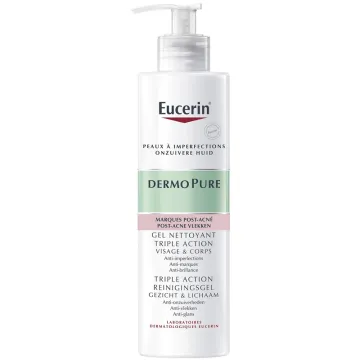
What is excess sebum and what are its main causes?
Excess sebum refers to the excessive production of sebum by the skin's sebaceous glands. This overproduction can lead to various dermatological problems, such as oily skin, acne and dilated pores. The main causes of this excess include genetic, hormonal, environmental and lifestyle factors, such as diet and stress.
How can excess sebum be reduced using natural methods?
To reduce excess sebum, we recommend adopting an appropriate skincare routine. Using gentle cleansers and toners based on natural ingredients such as green tea, aloe vera or clay can help regulate sebum production. It's also advisable to avoid oil-based products and favor non-comedogenic formulations.
Which skincare products are recommended for oily skin?
For oily skin, it's essential to choose products specifically formulated to control excess sebum. Products containing salicylic acid, zinc, niacinamide or sulfur are particularly effective. These ingredients help to deeply cleanse pores and reduce skin shine.
Can diet influence sebum production?
Yes, diet plays a crucial role in regulating sebum production. A diet rich in foods with a high glycemic index can stimulate sebum production, while a balanced diet rich in omega-3s, vitamins A and E, and antioxidants, can help reduce excess sebum.
What are the latest advances in dermatology for treating excess sebum?
The latest advances include laser treatments and photodynamic therapies that target the sebaceous glands to reduce their activity. In addition, research is underway to develop more targeted solutions that adjust the functioning of hormones involved in sebum production.
What role does sebum play in skin health?
Sebum is an oily substance produced by the sebaceous glands, which plays a crucial role in protecting the skin. It helps maintain hydration, protects against external aggression and helps keep skin supple and healthy. However, excessive production can lead to dermatological problems such as acne.
How can you tell whether your skin is oily or simply hydrated?
Differentiating oily skin from properly hydrated skin is essential. Oily skin often has a shiny appearance, particularly on the T-zone (forehead, nose, chin), and may have visible pores or acne. Well-moisturized skin, on the other hand, is soft and not excessively shiny.
What are the best ingredients to avoid in beauty products for oily skin?
For skin with an oily tendency, it's best to avoid products containing heavy oils such as coconut oil or shea butter, which can aggravateexcess sebum. Instead, choose products containing light moisturizers such as hyaluronic acid or glycerine.
Can oils be used on oily skin?
Using oils on oily skin may seem counter-intuitive, but certain oils, such as jojoba oil or squalane oil, can actually help regulate sebum production. These oils are similar to the skin's natural sebum and can help balance hydration without clogging pores.
What daily routines do you recommend to manage excess sebum?
To effectively manageexcess sebum, we recommend a daily routine that includes gentle cleansing morning and night, the use of a suitable toner, and the application of a light moisturizer. It is also beneficial to incorporate a clay mask once or twice a week to absorb excess sebum and purify pores.